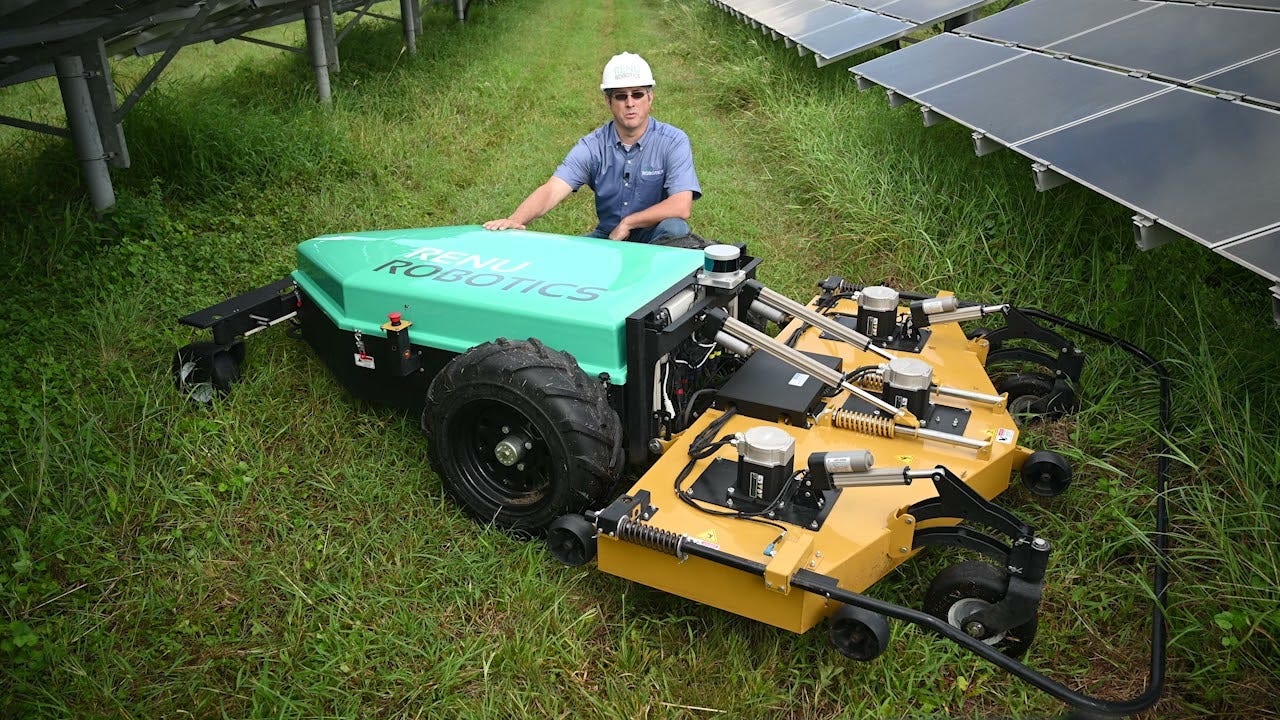































 Renu Robotics
Renu Robotics How do you stop weeds from overtaking that multi-million dollar solar facility? Thanks to a confluence of sensor developments and automation technologies, the answer is to call in the robots.
The problem is a big one, the kind of logistical strain that lives in the seams of enterprises and doesn't get much attention. Renewable energy utilities like solar and wind farms cover massive footprints and often exist in wild places where weeds and other vegetation grows naturally. Unchecked, that vegetation can cause massive infrastructure problems. But hiring people to take care of the weeds is both expensive and potentially perilous.
A company called Renu Robotics has developed a unique robotic mower for utility grounds management. The company has just announced a multi-year agreement with lidar developer Velodyne Lidar, Inc., which makes a small sensor, called the Puck, that can be used for autonomous navigation systems.
Robots have moved off the assembly line and into warehouses, offices, hospitals, retail shops, and even our homes. ZDNet explores how the explosive growth in robotics is affecting specific industries, like healthcare and logistics, and the enterprise more broadly on issues like hiring and workplace safety.
Read now"Velodyne's Puck sensors provide an essential ingredient for our robotic autonomy and navigation," said Michael Blanton, Renu's Chief Technical Officer. "The power-efficient sensors enable the Renubot to deliver an automated vegetation management system that is repetitive and reliable to keep facilities operating at peak performance while controlling costs."
This is a good illustration of the confluence happening between sensor development, autonomous systems, and renewable energy utilities, which, as I've covered, seem especially keen to adopt automation technologies for infrastructure inspection and maintenance tasks.
"With its sophisticated, sustainable-to-operate autonomous mower, Renu Robotics is revolutionizing the way solar and energy companies conduct vegetation management," said Laura Wrisley, VP of North America Sales, Velodyne Lidar. "The innovative Renubot demonstrates how Puck sensors power precision and safety in autonomous vehicles, operating without human intervention. Renu Robotics is a prime example of Velodyne delivering on its mission to improve safety and sustainability in communities worldwide."
The company's robot, called the Renubot, utilizes Puck sensors for safe, efficient, high-precision navigation and to avoid obstacles when conducting utility-scale vegetation management. The mower uses the lidar to navigate the site and real-time kinematic (RTK) GPS correction, enabling vehicle positional accuracy within 2cm. Renubot is a good example of small-form-factor autonomous robots of a kind we're seeing more of. It leveragesartificial intelligence (AI)and machine learning for autonomous command and control, and to learn and assess the topography as it conducts highly precise mowing and grooming of facility grounds.
 Etiquetas calientes:
Casa y oficina
Patio y al aire libre
Etiquetas calientes:
Casa y oficina
Patio y al aire libre